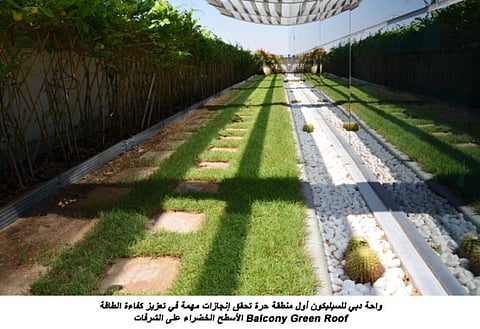Dubai Silicon Oasis achieves green targets
Green targets include reduction of carbon footprint, energy consumption

Dubai: Dubai Silicon Oasis Authority (DSOA) has succeeded in achieving its green targets, becoming the first free zone to do so, it was announced on Tuesday.
The DSOA has reduced its cumulative energy consumption by 31 per cent through a number of initiatives that aim to reduce the free zone’s carbon footprint well ahead of the Dubai Integrated Energy Strategy 2030 with a target of 30 per cent.
The free zione was able to achieve these energy savings by using smart systems and available technology that are inherently energy efficient like the use of LED lights. The DSOA’s switch of its 8,000 traditional lighting to LED reduced its power consumption by 26 megawatts. It further plans to step-up efficiency from the current 23 per cent savings to 28 per cent by the end of 2016 by increasing the number of LED lights to 10,000 bulbs.
In October 2015, DSOA, in collaboration with du, installed smart street lights on its roads that use motion sensors that provide 25 per cent visibility until triggered to full power by approaching vehicles and pedestrians, allowing for less energy consumption.
Speaking on these achievements, Dr Mohammad Al Zarouni, vice-chairman and CEO of DSOA, said DSOA is further developing its smart and environmental-friendly initiatives to reduce operational costs and increase clean energy usage within the Silicon Oasis premises.
“Through effectively contributing to these public initiatives, we demonstrate our commitment to establishing a sustainable model of energy conservation that offers an environment-friendly location for business partners, residents and visitors,” Dr Al Zarouni said.
Apart from smart lamp posts, two charging stations for electric vehicles were installed in DSO, while a third station is currently under construction.
DSOA was also able to reduce its carbon dioxide (Coemissions by 60,000 tons based on utility savings and reduction of trips taken by security patrols, facilities management fleet and garbage collection vehicles. Through the use of electric cars, DSOA aims to further reduce CO2 gas emissions by an additional 20 percent to reach a total of 72,000 tons by the end of 2020.
Other initiatives include a smart weather pole, a water-saving sub-surface irrigation system, a smart waste management system, green rooftops and walls, among others.



